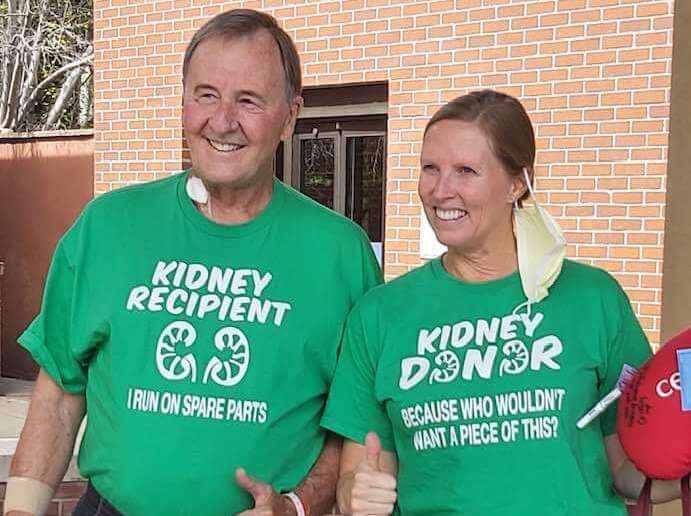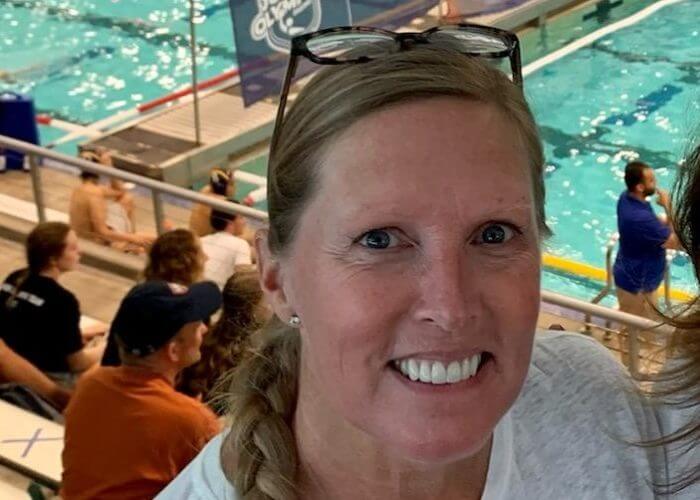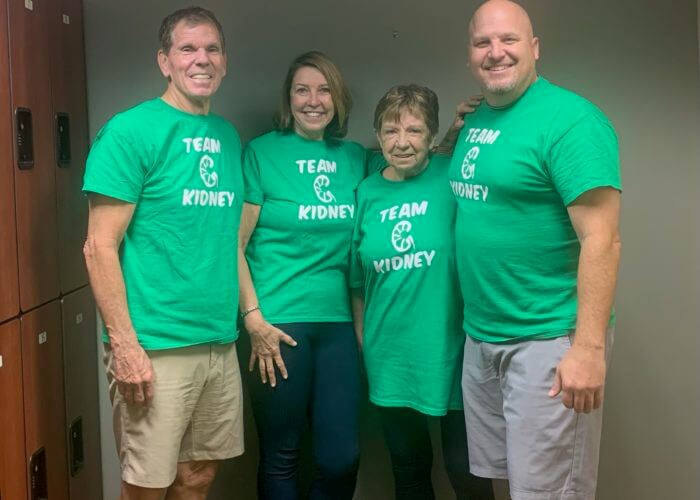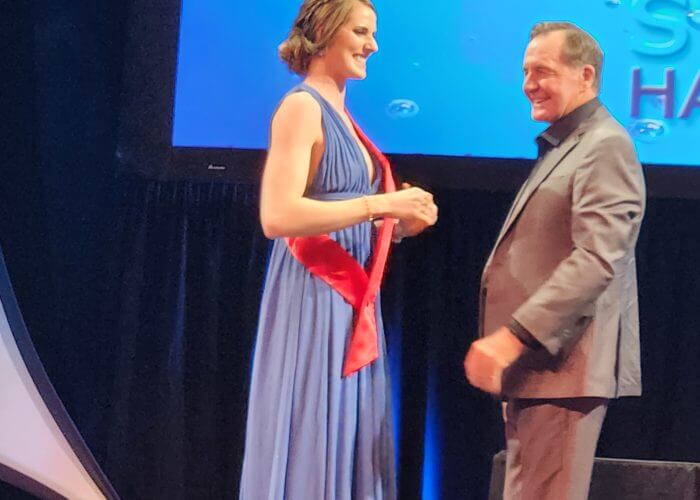How An Olympic Champion Saved a Life and Opened Doors: The Story of Crissy Perham and Dick Franklin

How An Olympic Champion Saved a Life and Raised Awareness: The Story of Crissy Perham and Dick Franklin
Olympic gold medalist Crissy Perham (competing as Crissy Ahmann-Leighton at the Barcelona Games in 1992) helped save the life of the parent of another Olympic gold medalist—Missy Franklin’s dad, Dick Franklin—by becoming a kidney donor in August 2022.
Crissy Perham is no stranger to intense focus on a goal. So when she saw the Facebook post shared into her feed in January 2022 and made a decision that would alter lives beyond her own, she turned on her tunnel vision.
Through mutual friends, Perham—who competed as Crissy Ahmann-Leighton when she won three medals at the 1992 Olympics—saw D.A. Franklin’s post that her husband, Dick, had reached end-stage kidney failure. To their network of friends, D.A. put out a request for a “Hail Mary” of an organ donor to save his life.
Perham saw the post, saw a chance to make a difference, and acted.
On went the blinders, honing her focus and containing her excitement: to avoid illness before donation, to check off boxes in preparing her side of the process mentally and emotionally, to be on top of her recovery after the transplant on Aug. 24, 2022, to stay healthy. The intense drive on not just the donation going well, but telling her and Dick’s story to advocate more to follow her path left little time for Perham to fully process all of what her choice meant to her.
So this September, more than a year after the surgery, Perham gratefully accepted an invitation to speak at the fifth annual Trivia for Life event in Denver, for the benefit of the American Transplant Foundation. When she got on the stage for her three-minute talk, Perham got as far as, “Thanks to the Franklin family and my husband, Charlie…” before a tidal wave of emotions overwhelmed her.
“I think I just, as a former athlete, you just march right through it,” Perham said last month. “To be a year removed from it—and realizing how amazing it was—is, I think, why it was so emotional a year post-op.”
Perham’s emotional response speaks volumes about her decision. Although she knew the reputation of Dick and D.A. Franklin—parents of Olympic gold medalist Missy Franklin—she had never met them. Their famous daughter didn’t factor into Perham’s decision to donate, their plea finding her in the right life circumstances to give an organ—so much so that Perham had intended to originally remain anonymous.
The delayed upwelling of emotion underscores how routine a decision Perham felt she was making. But it also evinces the power in the extended family that the kidney, which the Franklins dubbed “Olympia,” has created. Across three generations of families and two eras of American Olympic swimmers, it’s not just a selfless deed, but a testament to the interconnectedness of the swimming world.
“There’s not really words to describe,” Missy said. “This person was already miraculous. The fact that they were a match, that they were willing to do this for my father—and then to find out that connection (as Olympic swimmers)—I think we were just speechless, all three of us. It was almost hard to wrap your mind around how unbelievable that connection was.”
FROM IOWA TO THE OLYMPICS
Whatever else time may dull, there remains a tenacity to Perham at age 53. It’s easy to square the life-changing donor with the scrappy rise of an Olympic gold medalist.

Photo Courtesy: Crissy Perham
That’s in part because at first, there was no pool. Perham was born Crissy Ahmann—she married for the first time while at the University of Arizona to become Ahmann-Leighton—in Yankton, South Dakota (population 11,919 in 1970), and raised in New London, Iowa (2,043).
Until a trip to her grandparents’ house in California at age 6, she swam only in ponds. When it came time to train seriously, her parents drove her the hour roundtrip to Burlington, Iowa. Her dad, Leo, a teacher and basketball coach, eventually moved the family to Benson, Ariz., when Crissy was in high school, where the trip to train at a proper facility would be the 47 miles each way to Tucson in her 1982 Toyota Tercel.
The slight 5-8 butterflyer cut a different figure than her more imposing peers like Jenny Thompson. But that didn’t stop Perham from winning a pair of NCAA titles with the Wildcats and taking down Mary T. Meagher’s hallowed short course yards record in the 100 fly.
It led her to the Barcelona Olympics, where she won a silver medal in the 100 fly, outtouched by 12-hundredths by China’s Qian Hong’s Olympic record. (Perham had been 1-hundredth of a second quicker than Qian’s time in winning Olympic Trials in March.) She added gold medals for prelims of the 400 free relay and the final of the 400 medley relay, the latter a world record with Thompson, Lea Loveless and Anita Nall.
Perham gave birth to her eldest son, Alex, while competing. She was one of several stars from 1992 who fell just short of a second Olympics at the 1996 Trials, then retired shortly thereafter. She married Charlie Perham, an engineer and retired colonel in the United States Air Force, the family traveling often to California, Virginia, Nevada and eventually Texas. She became a swim parent to Alex and her younger son, Ryan, who followed Crissy’s footsteps to swim at Arizona.
All of it positioned her to be ready to answer D.A.’s call for a donor, even if Perham can’t quite put a finger on why that was.
“It’s been over a year, and I wish I had a better answer,” she said. “But I don’t know why. It just made me want to do something.”
A DONOR’S DECISION
Perham’s journey as a donor, in broad strokes, is an amazing act of selflessness. Fill in the lines, and it reveals a portrait of the swim community’s interconnectedness.

“Team Kidney” Frank Busch, Patty Busch, D.A. Franklin and Charlie Perham. Photo Courtesy: Crissy Perham
Perham had never met the Franklin family before deciding to donate a kidney to Dick. She saw D.A.’s post thanks to a share from mutual friend David Arluck, the former agent and founder of Fitter and Faster. (Perham had never met Arluck in person, either.) One of the few people Perham confided in about her plans to donate was Frank Busch, her coach at Arizona and a friend of the Franklin family from his tenure with USA Swimming while Missy was one of the program’s stars.
Perham intended to donate anonymously, a complicated decision that requires donor and recipient wanting to know the identity of the other and pursue a relationship. But Busch convinced Perham that getting to know the Franklins would be beneficial. Perham assented only a month before the procedure. “Frank was like, I think that you should meet them. I think they should know it’s you,” Perham said. “We’re a swimming family, they’re amazing people, you’re amazing for doing this.”
That group comprised the support network as the transplant neared. Perham stayed with the Busches before her procedure. Frank, his wife Patty, D.A. and Charlie were there the day of the surgery to provide moral and logistical support.
“Crissy didn’t know us from Adam,” Franklin said. “She knew of us, but there wasn’t a personal story. This was genuinely coming from the straight-up goodness of her heart…of ‘someone is in need and I could potentially fill that need, so I’m going to try.’ That in and of itself was incredible. And when we got to know Crissy…and it was like, oh my gosh, we could not have picked anyone better to become family! We absolutely adore her and Charlie.”
Perham knew of the Franklins and had watched Missy’s career from afar. She identifies as an Olympic junkie, even before her career. She remembers watching the 1976 Games as a kid and cites the 1980 Winter Olympics and 1984 Summer Games on American soil as “transformative” in shaping her goals. So of course she knew of Franklin’s achievements, of the five Olympic gold medals, the 11 World Championships, the four world records. But Perham was also attuned to the less glamorous side—of the injuries that hampered the latter stages of Franklin’s career and the way she battled the weight of expectations at the 2016 Olympics.
“It was so amazing to watch her as a high school kid, just the immense talent that she had, how long she could stay at the top,” Perham said. “Watching her struggle was heartbreaking—and we’ve all been there—and she just handled herself with such class and grace. I know she’s very well respected and well liked within the swimming community.”
When Franklin found out Perham was the donor, she made the choice not to look into Perham’s past. Instead, she wanted to meet and learn about Perham directly. Times and medals would be scant description of someone giving her something as valuable as more time with her father. Only a human connection could do that.
Franklin had married former Texas swimmer Hayes Johnson in 2019, and they welcomed a daughter, Caitlin, in 2021, almost a year to the day of her father’s transplant. The connection as mothers was another common trait that Franklin and Perham built their bond around.
“As a fellow mom, she really understood the gift that she was giving,” Franklin said. “I think she was able to see it from my perspective: Giving me time with my dad was so special, but giving my daughter time with her grandfather was even more of a priority.
“It’s something that every time my dad gets quality time with Caitlin, I text Crissy or I call her with, ‘I just want you to know, every single one of these moments that I look up and I see Caitlin and my dad together, or the moments where my dad and I are going out on a special date night together, I think of you every single time, because they would not be possible without you.’”
In that way, the relationship between the families has provided even more than the transplant. “Swimming has given me so much,” Franklin said, “but never in a million years did I think it was going to give me the person that was going to save my dad’s life.”
ON THE TRAIL OF ADVOCACY
Perham always obliges in discussing her donorship—she jokes that she won’t shut up about it. It comes with such genuine enthusiasm that exceeds merely her first-hand experience.
More than 100,000 people are waiting for an organ in the United States, a new person added to the national transplant waiting list every 10 minutes. On average, 17 people on that list die every day, despite more than 42,000 transplants performed last year. Almost 90,000 of those waiting need a kidney, a procedure that, like a liver transplant, can be achieved from a living donor.

Photo Courtesy: John Lohn
Perham worked with counselors to make sure she was emotionally prepared for her donation. Physically, she describes the procedure as orders of magnitude less onerous than a bout of appendicitis she suffered a decade earlier.
“I gave a kidney to someone on a Wednesday, I was discharged on a Friday, and I was walking through a farmer’s market on Saturday,” she said. “I didn’t realize the need for kidneys and livers. I didn’t realize how you could be a living donor and how many people needed help until I got into it.”
Perham lived an active life before donation and continues that lifestyle with few restrictions. She’s an avid CrossFitter, tailoring workouts after the surgery and finding community in the gym. She and two former Arizona teammates walked more than 130 miles through Western Europe in the Camino de Santiago this year.
In the water, she teamed with Kidney Donor Athletes for a relay in the Swim for Alligator Lighthouse in the Florida Keys. The self-professed “black-line girl” took to open water with two fellow kidney donors and one recipient, kayaking for two three-mile stretches between a pair of one-mile swims. “Our priority was to raise awareness that you can donate an organ or receive an organ and still lead a super, super active life,” she said.
Franklin, an outspoken advocate, has added organ donation to her list of philanthropic priorities. She’s partnered with Otsuka Pharmaceutical to raise awareness about Dick’s condition, autosomal dominant polycystic kidney disease (ADPKD), and about the need for living donors.
Perham gets a tad sheepish when she admits that two friends have become living donors after learning of her experience. But the magnitude of what that decision means—of the two families they’ve helped, of the family she’s grown into thanks to her donation—brings that intensity back with full and unapologetic force.
“I feel super moved about being an advocate for it now,” she said. “And knowing that two people literally have donated because of me, I’m so, so proud of that.”




Thanks for sharing our story, Matthew.

Wonderful people. Wonderful service. Wonderful appreciation.
And among the other fruit of Crissy’s life was touching many youth as a highly effective high school swim coach for a period at Tucson Salpointe Catholic.